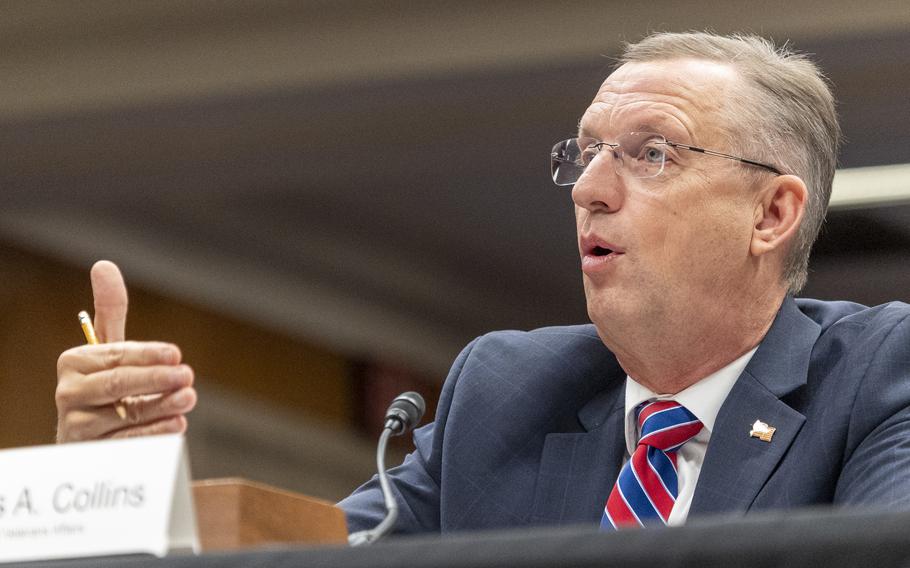
VA Secretary Douglas Collins testifies Tuesday, June 24, 2025, in Washington during a Senate Appropriations Committee hearing on the Department of Veterans Affairs budget for fiscal year 2026. (Eric Kayne/Stars and Stripes)
The Department of Veterans Affairs disability claims process is a critical lifeline for veterans seeking compensation for service-related injuries or illnesses. Its complexity and delays, however, prompt veterans to seek assistance from diverse sources.
As a veteran with decades of military and federal service, throughout the years I’ve viewed Veteran Service Organizations (VSOs) as key allies assisting with such claims, as well as performing other helpful activities. President Donald Trump has been making great progress in reducing a tremendous backlog of claims, those without action in 125 days or more, from 264,000 to 198,000, a 25% decrease, just in the four months since returning to the White House.
Moreover, with significant ongoing and long overdue staffing cuts to the VA, his administration is focused on efficiency and innovative ways to deliver for veterans. Secretary Doug Collins was absolutely correct when he noted earlier this year “we’re not an employment agency,” underscoring this point.
Though in recent years I’ve witnessed some of the largest veteran organizations gradually become more sharp-elbowed in the disability claims space to the point of dishonesty. In apparent efforts to preserve a major funding stream via public donations in return for documenting specific services to a dwindling pool of veterans each year, I was surprised to find out that they are pushing to criminalize small businesses that perform similar work.
Most recently, I was surprised to see the level of misinformation in a VFW “Action Alert” criticizing a bill in Congress introduced by retired three-star Marine general Rep. Jack Bergman, R-Mich., last month called the CHOICE for Veterans Act of 2025, H.R. 3132. Since the draft bill, which just cleared the House Veterans’ Affairs Committee, allows VSOs and fee-based disability claim assistance companies to coexist, VSOs are trying to sink it. That approach is harmful to veterans.
Here’s a look at fact vs. fiction about this congressional action compared with what some VSOs are saying:
Fiction: The bill puts veterans in debt.
Fact: It protects veterans by blocking payments upfront and ensures they don’t get charged more than they earn. Veterans only pay if they increase their benefits.
Fiction: Veterans won’t be told about free assistance.
Fact: It mandates the VA show clearly marked notifications on its web portals that free help is available from VSOs and congressional offices.
Fiction: Veterans can be charged unlimited amounts of fees.
Fact: A rigid fee cap is included. The lesser of $12,500 or five times the monthly increase. For example, if the veteran wins $1,000 a month in additional benefits, the max they can be charged would be $5,000.
Fiction: The bill opens the door to abuse from so-called “claim sharks”.
Fact: It protects veterans by blocking direct solicitations of those recently discharged, forbidding promises of guaranteed benefits and other prudent safeguards.
Fiction: The bill strips veterans of control.
Fact: The opposite is true. It gives veterans more options on claims assistance, not fewer. In addition to VSO and congressional free help, they can work with independent small businesses that charge fees if they win results.
The VA disability claims process is evolving, with VSOs and fee-based companies playing complementary roles. One should not try to outlaw the other to preserve their bottom line. VSOs remain key to supporting veterans through the VA’s intricate claims process, but they cannot solely support the demands of the millions of veterans needing assistance. In 2023, the chief executive of the American Legion said as much, admitting that VSOs simply don’t have enough staff to help alleviate hundreds of thousands of backlogged claims.
Criticism by some VSOs, particularly the VFW, for wrongly suggesting things like third-party fees are uncapped underscores the need for clarity. The VA’s new rule on fees, which went into effect two months ago, as well as the CHOICE Act, clarify that fees must be reasonable.
By addressing misconceptions about fees and promoting transparency, VSOs, the VA and fee-based entities (typically veteran-owned small businesses) can ensure veterans receive their earned benefits with dignity. Veterans deserve the help they need as long as it’s honest, clear and transparent. VSOs spreading misinformation is not helpful to those they were designed to serve.
John “Wolf” Wagner is a former White House Senior Executive Service appointee to the Department of Veterans Affairs and Department of Health and Human Services, retired Army officer and Iraq War veteran. He served a combined 35 years in the military including at U.S. Central Command and U.S. Northern Command.